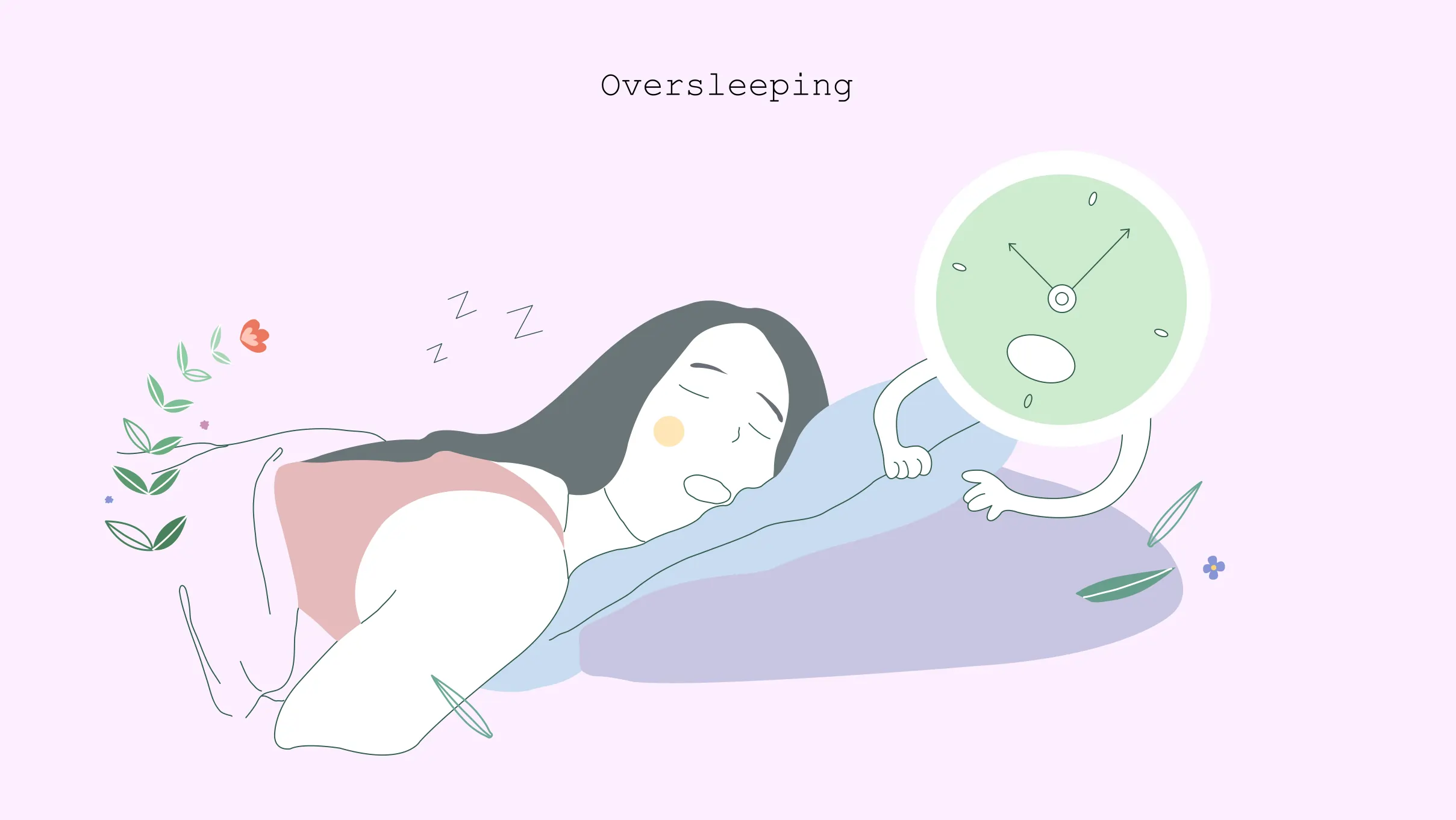Oversleeping – How Much Sleep Is Too Much?
Written by

Medical reviewed by


We have all heard that too little sleep can harm your health. But what about oversleeping? Well, too much sleep can also adversely affect your overall well-being. Oversleeping can be linked to adverse health outcomes including various metabolic and lifestyle disorders and even put you at a higher odds of developing cardiovascular diseases. From putting you at risk of diabetes to even heart disease, oversleeping is linked to various medical problems. What is considered oversleeping? Well, we bring you everything you need to know below. Keep reading!
What Is Oversleeping?
Usually, adults need 7 to 9 hours of sleep each night. However, this can change based on individual needs. Is 6 hours of sleep enough? For some, 6 hours of sleep can suffice, whereas others may need 10 hours. Oversleeping doesn’t pose a threat to people who need an extra hour for a good night’s rest. It affects individuals who regularly opt for sleeping more than their body needs.
How Much Sleep Is Too Much?
Take a look at how much sleep you need to learn how much sleep is too much.
| Age | Hours Of Sleep Per Day |
|---|---|
| newborn baby | 14 – 17 hours (includes naps) |
| infants | 12 – 15 hours (includes naps) |
| toddlers | 11 – 14 hours (includes naps) |
| preschool-age children | 10 – 13 hours |
| school-age children | 9 – 11 hours |
| teenagers | 8 – 10 hours |
| adults | 7 – 9 hours |
| seniors | 7 – 8 hours |
Side Effects of Oversleeping
Oversleeping is also known as hypersomnia. Take a look at all the oversleeping side effects.
- Diabetes: Studies have shown that excessive sleeping or sleeping too little can put you at a higher risk of developing diabetes.
- Obesity: Sleeping too much is associated with obesity. A study reported that people who slept for more than 9 hours were 21% more likely to become obese despite proper exercise and food intake, as a result of oversleeping
- Headache from oversleeping: While sleeping too little can cause headaches, oversleeping can also leave you feeling tired with headaches.
- Back Pain: One might think that sleeping keeps back pain away. However, oversleeping can be one of the reasons why you suffer from back pain.
- Depression and oversleeping: Insomnia has been widely linked with depression. On the other hand, oversleeping equally increases the difficulty of having a proper sleeping pattern.
- Heart Disease: Women who slept for 9-11 hours had a heightened odds of developing cardiovascular diseases.. Excessive sleep length stresses the body and raises C-reactive protein (CRP) levels, a crucial inflammatory marker linked to heart disease.
- Cognition: It is seen that cognitive abilities peaked in individuals who slept for seven hours every night, while oversleeping lead to increased memory and cognitive impairment
- Degenerative Diseases: Is oversleeping bad? Yes. Oversleeping might lead to degenerative diseases like Alzheimer’s.
How to check for Oversleeping Symptoms
Some of the oversleeping symptoms are;
- Experiencing excessive daytime sleepiness
- You feel sleepy even after sleeping for more than 7 to 9 hours
- You experience confusion and seem to be in a state of ‘sleep drunkenness’
- Your naps don’t refresh you
- You feel anxious and irritable all the time
- Your energy levels are consistently low
- Slow thinking, slow speech, memory problems and focus issues are something you regularly experience
- Loss of appetite, frequent headaches and hallucination
10 Tips to stop oversleeping
If you have been experiencing the symptoms of oversleeping, try the below tips for how to stop oversleeping. However, if you are sleeping for 12 hours a day or more, visit your doctor for the right oversleeping cure.
Have A Routine
A simple trick you must follow to rectify oversleeping is to create a bedtime routine for yourself where you have a consistent sleep-wake time. It helps your body get accustomed to this schedule. You can also include a good sleep hygiene routine to get into the zone before you doze off, such as a warm bath, meditation, listening to soothing music, and more. Also, make sure you avoid any stimulants.
Drink Coffee
Try drinking a cup of coffee as soon as your alarm goes off. When you sip on your morning coffee or chai, the caffeine present in them can make you feel less tired or sleepy.
Don’t Hit The Snooze Button
If you tend to sleep a lot, then chances are you hit snooze as soon as your alarm goes off. When you snooze and go back to sleep, it can make you feel tired and less productive. And without an alarm, you may end up sleeping all day. Therefore, you can try placing your alarm away from you.
Get As Much Daylight As Possible
As soon as you wake up, open the curtains of your bedroom or go out in the sun. This helps stabilise your body’s inner biological clock, known as circadian rhythm.
Ask For Help
If you cannot wake up on time, you can always ask your partner, roommate or family member to wake you up at a particular time. Doing it regularly will soon become a habit.
Say No To Naps
Sleeping too much, even in breaks, can make you feel more tired. Therefore, if you are sleepy during the daytime, opt for other methods to keep you awake, such as going for a walk, drinking coffee, or keeping yourself hydrated.
Keep A Sleep Diary
If you are a chronic oversleeper, you must keep a sleep diary. It helps you record your sleep and wake timings and lets you track your sleep quality.
Avoid Blue Light Before Bed
Keep your electronics away at least 30 minutes before bed as the blue light emitted can interfere with your sleep. Even if you enjoy reading before bed, try to avoid phones.
Maintain Routine Even On Weekends
It is essential that you avoid oversleeping on weekends or holidays as this could contribute to Sunday night insomnia. It is when you experience sleeplessness every Sunday night due to oversleeping.
Speak To A Specialist
If nothing works for you, speak to a healthcare professional, as oversleeping can be a symptom of depression.
Oversleeping once in a while when you are exhausted is okay. However, sleeping more than 9 hours daily can negatively affect your health. Try to rectify your sleep routine on your own. But if it doesn’t work, make sure you visit your doctor.
Conclusion
Oversleeping once in a while when you are exhausted is okay. However, sleeping more than 9 hours daily can negatively affect your health. Try to rectify your sleep routine on your own. But if it doesn’t work, make sure you visit your doctor.
FAQs
What happens if I sleep too much?
As aforementioned, oversleeping causes adverse health effects and can lead to diabetes, depression and more.
Is it healthy to sleep 12 hours a day?
No, on average, you need 7 to 9 hours of sleep every day.
Why Does oversleeping make you tired?
Wondering, can oversleeping make you tired? The answer is yes. Why? This is because it upsets the body’s normal circadian rhythm and can elevate daytime fatigue.
How much is too much sleep a day?
Anything more than 7 to 9 hours is too much. So, if you are wondering, is oversleeping a real thing? Yes, and it can lead to severe ailments.
How much sleep do you need by age?
Look at the above table in the blog to see how much sleep you need by age.
Why do I like to sleep so much?
If you are wondering why I sleep so much, you could have hypersomnia. Some of the factors that can contribute to hypersomnia include current medications, frequent alcohol and drug abuse, other sleep disorders or genetic links.
How to take a short nap without oversleeping?
Make sure you set the alarm and don’t go beyond 30 minutes.
How to feel better after oversleeping?
Some of the tips you can try to feel better after oversleeping include;
- Stay hydrated
- Have a meal or eat some fruits if you don’t have an appetite
- Have caffeine, maybe a cup of coffee or chai
- Exercise
people like this article
Written by

Medical reviewed by



